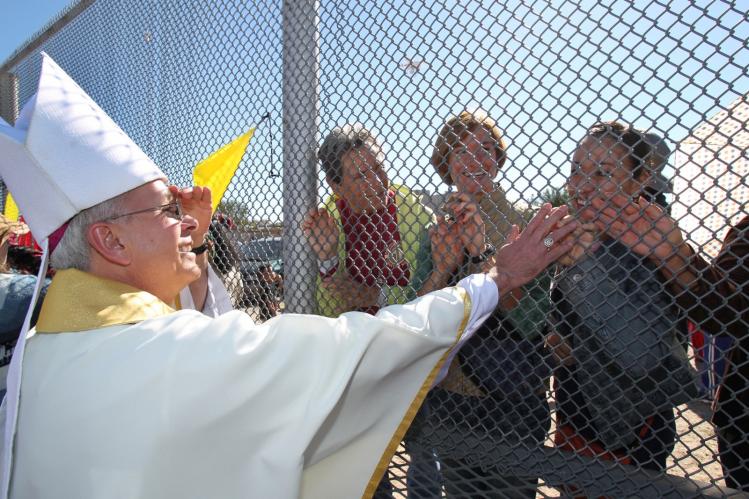
Catholic bishops defend the dignity of all immigrants, regardless of legal status, and for years have challenged both Democratic and Republican political leaders to pass comprehensive immigration reform. But it’s not every day that you hear a bishop compare his state’s attorney general to a Pharisee, and remind those in power that Jesus called out the legal guardians of his day for using the law as a bludgeon.
Bishop Mark Seitz of El Paso, Texas, whose diocese is on the United State-Mexico border, is emerging as one of the boldest Catholic leaders at a time when the Trump administration’s ramped-up detention and deportation regime has cast a shadow of fear over communities across the country. Immigration and Customs Enforcement (ICE) officials now have a sweeping mandate to deport even those undocumented immigrants who clearly pose no security risk. After Texas’s attorney general Ken Paxton and nine other state attorneys general recently announced they would sue the Trump administration if it does not rescind Obama-era protections for “Dreamers”—undocumented immigrants brought to the United States as children—the bishop didn’t hold back. In a Religion News Service commentary that attracted national attention, he wrote:
Are the roles of the scribes and Pharisees being played out again today? Paxton and the nine other attorneys general argue that it’s not enough to exercise our country’s legal prerogatives regarding immigration with the adults who have sought refuge within our borders. Must we go even further and also lay the heavy burden of the law on the children they brought with them? Will we wrench Dreamers from their schools, communities and the only homes they have ever known? Will we send them away because they are not “legal”? Around 220,000 young people in Texas will be out of school and out of productive work: a classic formula to create the desperation that makes drug dealing and other crime appear to be the only option.
The leaders of Jesus’ day thought by fulfilling the minutiae of the law they could be righteous before God and, more importantly for them, appear righteous before human beings. Jesus answered that they should have practiced a higher law, that of justice and mercy and faithfulness.
When I hear this legalistic insistence upon every letter of our broken immigration law being carried out to this cruel degree, I can hear Jesus’ indignant response: “Woe to you, scribes and Pharisees, you hypocrites.”
Last week, Bishop Seitz also released a timely and powerful pastoral letter on migration that calls for a “moratorium on the deportation of non-violent immigrants” until comprehensive immigration reform is passed. “Building walls, deploying a mass deportation force, and militarizing our border are not long-term solutions to the challenges of migration,” the bishop writes.
The pastoral letter, according to the Hope Border Institute, is the first immigration letter from a diocesan bishop in nearly a decade, and the first to specifically discuss the theme of militarization of the border. In addition, the El Paso diocese announced the creation of a scholarship program for “Dreamers” to attend Catholic schools, along with a “rapid response team” that can be deployed to accompany and advocate for undocumented immigrants who are detained.
During a conference call with Catholic advocates and immigration specialists, the bishop cited Pope Francis, who visited the border area last year where Seitz’s diocese is located, as a source of “great inspiration.” The pope has from the start of his papacy made the plight of migrants a priority, and scuffled with Donald Trump over the then-GOP candidate’s call for a massive border wall. Bishop Seitz said he hopes the pastoral letter and El Paso’s efforts can be “a bit of an incentive, stir the pot and encourage us all to speak out more.”
Given the nature of leading a diocese, bishops are sometimes cautious managers who can get bogged down by bureaucracy. But these are not ordinary times. The Trump administration and conservative politicians in states across the country are essentially declaring war on immigrant communities. We need more bishops willing to “stir the pot” and hold the powerful accountable.
